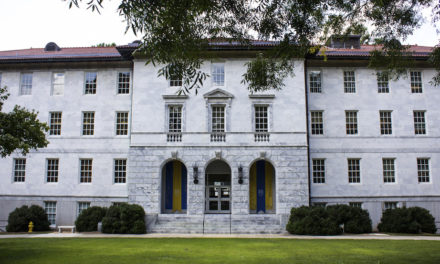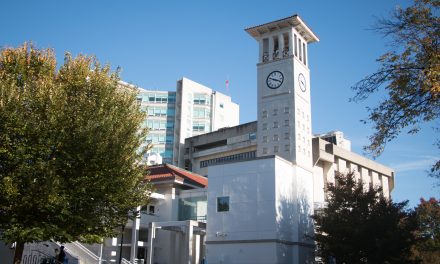The Robert P. Apkarian Integrated Electron Microscopy Core (IECM) facility at Cherry Logan Emerson Hall is expanding to the O. Wayne Rollins Research Center, according to Assistant Dean of Research at the Emory University School of Medicine Michael E. Zwick.
The expansion is happening as Emory gains a new technology which allows it to perform a new scientific technique known as single-particle electron cryomicroscopy (cryo-EM). The technique allows researchers to examine macromolecules, like proteins and lipids, in their native environment without staining them. The School of Medicine has purchased two new transmission electron microscopes (TEM) to perform the technique.
The expansion is intended to accommodate the two new microscopes, said Zwick, who also serves as the assistant vice president for research at the Robert W. Woodruff Health Sciences Center (WHSC).
The expected project cost is listed at $1,252,000, according to DeKalb County records of a permit application submitted by Hogan Enterprises, the contractor.
Cryo-EM is a Nobel-prize winning technique that fires beams of electrons at proteins that have been frozen in solution to image biomolecules’ structure, creating a 3-D diagram of the molecule, according to The New York Times. The new method, which is being adopted across labs nationwide, can take pictures of proteins that can’t easily be formed into large crystals, according to The Times.
Northwestern University (Ill.), Rice University (Texas) and Washington University in St. Louis (Mo.) obtained their cryo-EM “titan krios” microscopes in 2014, 2010 and May 2017, respectively.
Construction of the ICEM facility is expected to be complete by February 2018, with the installation of the microscopes commencing directly thereafter, Zwick said. By April 2018, the facility is expected to be open and operating, according to Zwick.
Zwick also stated that the Emory Division of Animal Resources’ animal research in one of the buildings under construction will be uninterrupted by the construction process.
“We understand the sensitive nature of construction with regards to animal research and want to work together to find the right schedule for accommodating everyone’s needs,” Project Manager Wayne Angel wrote in a Nov. 13 email to the affected Emory employees.
Electrical and steam piping work will continue into 1492 Clifton Road building and the bio-connector, which connects the Rollins building with the 1492 Clifton Road building, according to Angel’s email.
The College of Arts and Sciences and the School of Medicine jointly finance and own the Apkarian facility.
“We need a place to put [the microscopes] and so we need to build a core facility that is widely available for everyone at Emory to use,” Zwick said. “[Cryomicroscopy] is associated with recruitment in the Biochemistry Department. There’s interests for faculty users in the Chemistry Department in the College. … Eventually, [the facility] will be available for anybody to use in the state of Georgia who does this sort of research.”
Zwick said that this technology would help scientists who are “trying to solve three-dimensional structures of macromolecules … so faculty in the Department of Biochemistry for the School of Medicine are users [of this technology], faculty in the Department of Chemistry in the College would also be, since the facility is a shared partnership.”
Zwick commented on the new technology’s many uses, ranging from understanding antibiotic resistance to drug development and interaction.
Associate Professor in Biochemistry Christine Dunham, who conducts research on the structure of ribosomes, said the cryo-EM would directly aid her work.
Zwick said that cryo-EM technology would honor the University’s dedication to research and knowledge.
“This is an exciting opportunity. … The new provost has talked about Emory’s research and building research capacity throughout the entire University, and I think this sort of project aligns with that goal,” Zwick said.
Emory’s Yerkes National Primate Research Center is also attempting to renovate its facilities.
“Yerkes renovating one of our Main Center buildings into flexible animal housing space, which we will use for research studies, animal quarantine and veterinary care,” Yerkes Public Affairs Chief Lisa Newbern wrote in a Nov. 28 email to the Wheel. “We expect the construction to take about four months.”
The construction has not yet started. According to DeKalb County Planning and Sustainability Office Assistant Cheryl Bagby, the plans based on the permit application for the Yerkes construction have “failed,” and the applicant “will need to pick up the failed plans to submit with the revised corrections.”
The expected project cost, according to the DeKalb County records of a permit application submitted by Victoria West, the contractor, is listed at $567,000.
Richard Chess and Alex Klugerman contributed reporting.
Former Editor-in-Chief | Madison Bober (20C) is from Hollywood, Florida. She majored in political science and minored in women’s, gender and sexuality studies.




